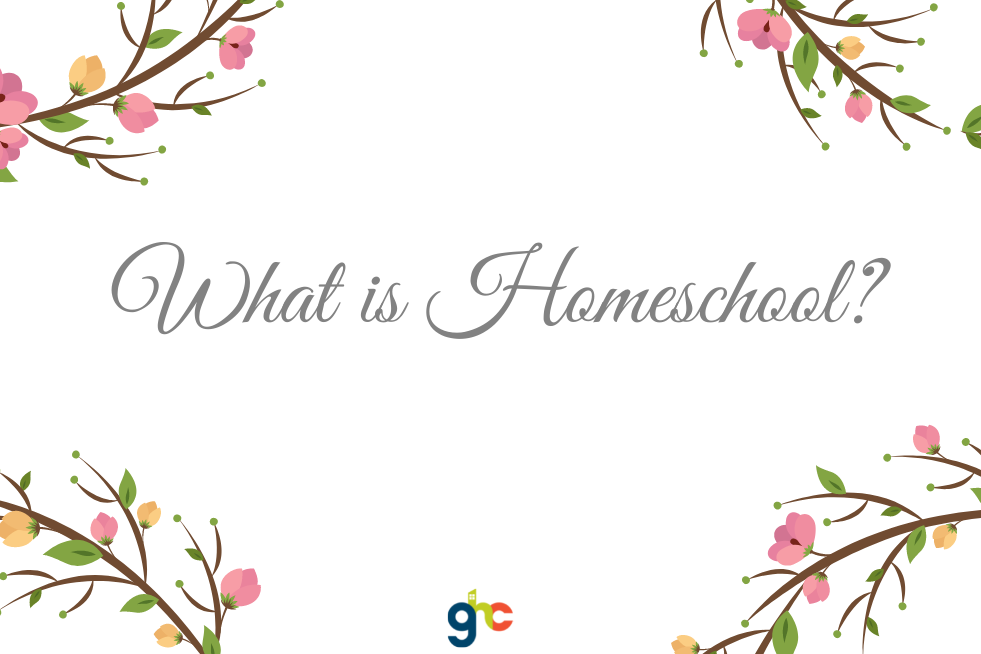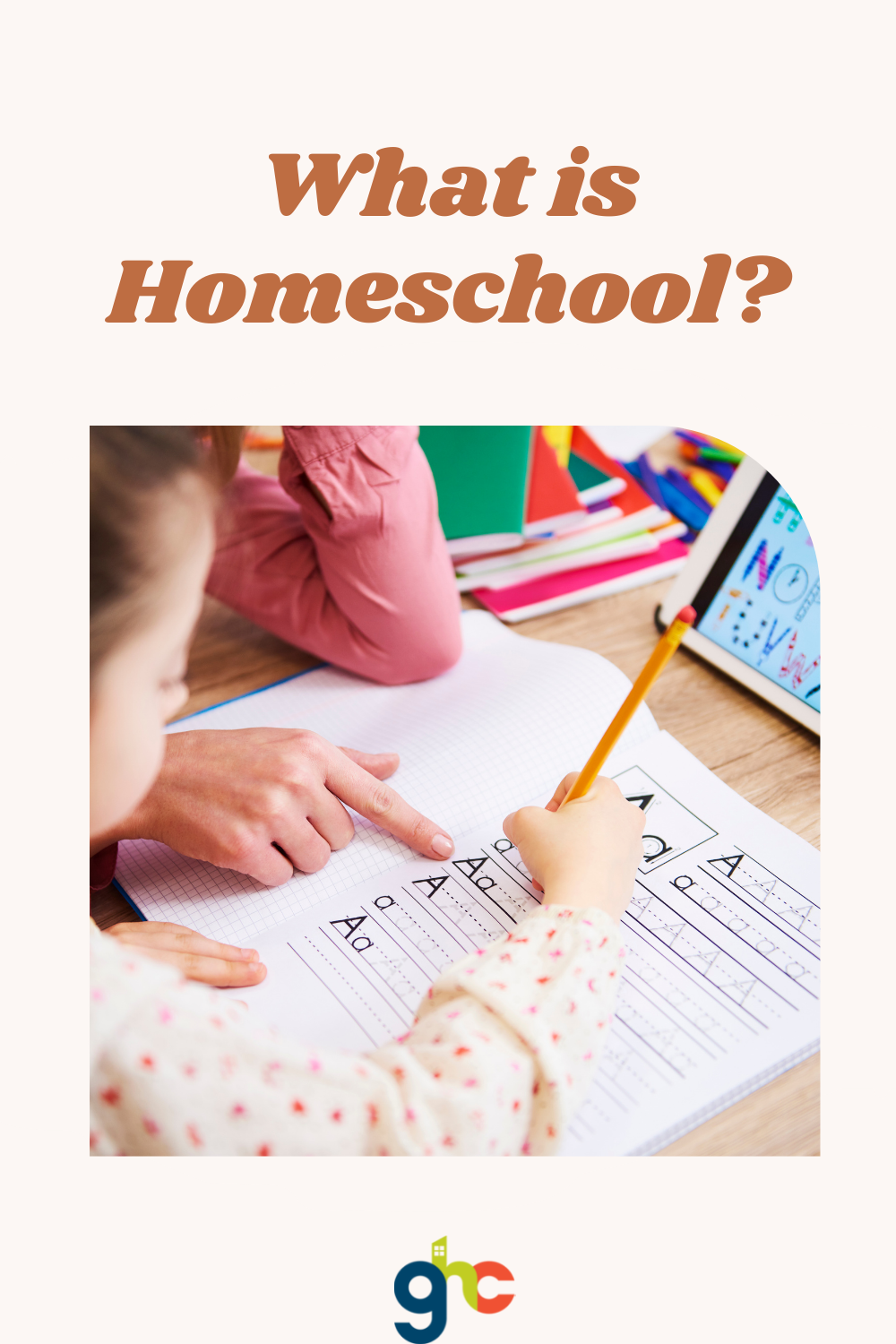You might not have come right out and asked, but this is still a very reasonable question, “What is Homeschool?”. Especially when you’re just getting started on the magnificent journey. You’re likely to ask it again at some point after you’ve been homeschooling for a while. Or you might ask it when you start to think you might have made the wrong decision. Because those days will come! Spoiler alert: as wonderful as the process is, it’s not all peaches and cream, no matter how much we’d like it to be.
The truth is, answering this question is a bit more complex than a simple sentence. But, it’s important to answer it, just the same. You’ve got questions, and I really want to help you answer them! Sure, I could set aside the meat and potatoes and give you all desert, but you deserve a ‘square meal’; all the ‘nourishment’ you can get as you start this journey. It really helps.

What Homeschool Is NOT
I want to start by telling you what homeschooling is NOT. Because even in my own experience with homeschooling, I had placed unrealistic expectations on myself and my child. That did nothing but frustrate us both. This doesn’t just put you behind schedule (which isn’t always a bad thing, by the way), but it can make you doubt the entire process.
Homeschooling is NOT “doing school at home.” What do I mean by that? Well, think about everything that public school entails. Getting up early, adhering to rigid schedules, maintaining a “status quo” in keeping up with what is considered age-appropriate materials, and taking a certain amount of time to get through a specific educational regimen, whether too slow or too fast.
These, and so much more, are facets of the mainstream schooling process you can leave behind. Of course, there isn’t a thing in the world wrong with getting up early. But, maintaining a specific time every single day can often be as harsh as forcing your child to spend a week on a spelling list they’ll master in two days. For instance, my own child did much better when I let her sleep until about 9, and sometimes 10 in the morning, this worked much better for our family. On the other hand, you might have an early riser that enjoys getting started as the sun comes up. The good news? Neither is wrong, YOU get to decide what is best for your own home!
Homeschooling is NOT letting society decide what is best for your child. True, some certain subjects and topics are necessary to be able to function well. But that’s not what I’m talking about. I mean that, as a whole, it just doesn’t make much sense to lump 20 to 40 students into one room or grade level. And expect them all to function on the same level across a variety of subject matter. And it certainly doesn’t make sense to maintain that ideology when you are homeschooling your child in a one-on-one setting like the private educational space.
Are There Legal Requirements to Homeschool?
Yes, there are legal requirements in every state. You can find a list of simple guidelines HERE for your own specific state and I encourage you to do more research on the specific state you’re in to make sure nothing has changed by the time you read this.
At a glance, here are some quick facts about specific states.
Alaska, Texas, Oklahoma, Missouri, Iowa, Illinois, Indiana, Michigan, New Jersey, Connecticut, and Idaho do not require that parents initiate contact or send notice of their intent to homeschool. All the other states do, but they all have different specific laws that you MUST be familiar with. Research them diligently, or contact Great Homeschool Conventions and let us put you in touch with the right people.
The highest homeschool regulations are imposed on those who live in Pennsylvania, New York, Vermont, Massachusetts, and Rhode Island. These regulations can include notifying the school board of intent to homeschool, as well as the requirement of having your curriculum approved by the state. Parents must hold a teaching qualification and state officials can conduct home visits throughout the school year. While these are not all the regulations, it does give you some idea of what to expect while homeschooling in these states.
If you are preparing to homeschool, or even if you’ve already started the process, there are other ways to have the best possible experience in the state in which you live. For instance, stay up to date with any news and legal information regarding homeschool in your state. Find out if there are specific organizations, co-ops, or homeschool programs in your local area of which you can take advantage. These can help a great deal as questions come up throughout your homeschooling adventure.
When Should Homeschooling Begin?
As you review your local state laws concerning the “compulsory attendance age” you will see the earliest age at which your child is expected to receive instruction. This can vary from state to state, but many parents - regardless of the laws - choose to start a bit earlier. Even at prek level, around the age of four or five, is certainly not unheard of and, in fact, we naturally start teaching our children long before this time. Colors, hand-eye coordination, interactive learning, and other types of skills can be learned as early as your child seems ready. And that’s an awesome aspect of your homeschooling experience.
Some parents choose to wait longer to start into an actual homeschool schedule. They believe that they are already busy learning in those early years and should be allowed to explore their world until about the age of eight. The truth is, you know your child better than anyone else, and you’ll know when they’re ready.
If you have previously allowed your children to attend public school, you might wonder what is the best time to transition them out. We’ll discuss this in another article addressing this situation in its entirety. However, in short, it’s safe to say that you can pull your child's enrollment at public school almost anytime to enroll them in homeschool. Be sure, BEFORE DOING SO, that you carefully consult the laws in your home state. If you are in accordance with those regulations, you will be fine.
What Are the Benefits of Homeschool?
Homeschooling has so many benefits, you might find yourself wondering where to start! What’s more, there will be benefits that are specific to your own family that might not be important to another. That, in and of itself, is a great benefit too. But let’s start with some of the most basic benefits that are true across the board.
Tutorial, One-on-One Style
When I was watching my oldest son, who has high-functioning autism, struggle through upper elementary, his education team discussed his special needs. One of these needs was to have a dedicated instructor included in his daily routine, specifically for him. This instructor/tutor would help keep him on track and focused, helped him make sure his work was finished, and just generally assisted in any area where he needed it.
That’s when I had a eureka moment: every child does better with this type of instruction, and that’s just what homeschool provides! Instead of being “one in thirty,” your child gets a devoted educational program that keeps up with their level, and not the other way around.
I wound up homeschooling my son after that meeting, bringing his level of functionality from a first-grade level to a fifth-grade level in just over a year and a half. And I’m so glad that I did!
Flexibility
Having the opportunity to be truly flexible will mean more than you probably know, starting out. It really makes a difference when you’re moving along at your child’s pace instead of the pace set out by public school systems. For instance, the majority might be expected to grasp a particular math or grammar concept in a week. Being flexible means that you can make adjustments if your child learns the concept in three days. You can also make adjustments if it takes two weeks. Neither situation is “wrong” but in a public-school setting, grades (and thus, self-esteem) can be greatly damaged by flawed expectations.
A good example is my own daughter, who wanted to “try out” high school for her freshman year. We enrolled her, and it was the most horrible year of her entire school experience. She was relentlessly bullied, and because she couldn’t participate due to extreme reactions to the bullying, she was not only singled out in the classroom but threatened with expulsion into a school for the behaviorally challenged! To say that her self-esteem was damaged is a massive understatement. Upon removing her from that school at the end of the year, she actually tested out of all the subjects she had “failed” in the public-school setting.
Flexibility also allows you to work with your child until specific concepts are mastered. So many times, our children need that sense of accomplishment that comes with a complete understanding of a specific concept or lesson. At the same time, it allows them to explore and develop specific talents and interests, either aside from or parallel with, an ongoing level of learning.
Socialization & Strong Relationships
One of the first questions you’ll be asked once you commit to homeschooling is, “But how will your child deal with no socialization?” The truth is, there are actually more opportunities for positive socialization while homeschooling than in a public-school setting. Instead of being in a classroom with 25 to 40 other students in the same age group, with a few adult interactions throughout the day, they will be introduced to a wide variety of age groups regularly. This gives our children the opportunity to learn how to adapt to a variety of social situations, creating a very well-balanced young person.
There are so many opportunities for socialization! Many cities have homeschool programs, support groups, and co-ops where you can meet other homeschool families. There are also many sports programs for homeschoolers, or some cities allow homeschool students to be a part of the same teams as public students.
On the flip side of the same coin, it allows us to limit access to influences we deem detrimental to our children. Those influences might hold specific beliefs, morals, or behavior that are against what we believe to be important. Since we live in an age where offenses seem to be assigned, we must be careful of the influences we allow during our children’s most important years.
Early College & Career Prep
Many homeschooled students have the opportunity to get a head start on their high school diploma and college education. Often, this can take the form of online courses or a here-and-there class at a local community college during the senior year of homeschool. This helps to get general coursework out of the way, laying a great groundwork for a vast variety of career choices.
Which Homeschool Style Should I Use?
There is no single answer to this question. In fact, this is an area where you’ll want to do some research for yourself. There are several homeschooling styles available, and each one has its own set of distinctive qualities. That means one will likely be much better for your intents and purposes than all the rest.
On the other hand, you might want to pick and choose, utilizing specific resources for different subjects. You can always mix and match the homeschool curriculum to better fit your children. For instance, you might really enjoy the math resources from the Abeka curriculum. At the same time, you might also fall in love with the program for another subject from the Sonlight curriculum. There is no one best homeschool curriculum, it is all about what works for you and your family!
The point is, choosing a homeschooling style is deeply personal, pertinent to the specific needs of your child, and should be considered in light of all your needs. Here’s a list of some of the most popular homeschooling styles.
Relaxed
Unschooling
Eclectic
Charlotte Mason
Classical
Unit Studies
Montessori
How Much Does it Cost to Homeschool?
Prices on specific curriculum choices can vary greatly. Some homeschool families choose the cheapest options for curriculum and teaching supplies, while others go all-out. The truth is, you can create your own budget and build on that over the years.
Getting started may cost a bit more, especially if you choose to utilize a chalkboard or dry erase board or if you intend to add electronic devices dedicated to your homeschool space such as laptops, projectors, or printers. However, these purchases can usually be used for years to come, and this fact should always be considered.
Other expenditures that should be considered are field trips and extra-curricular activities if you intend to make use of those. Also, don't forget to look for free printable activities to add to your lesson plans! As with other aspects, these are very personal choices and can be as frugal or lavish as you deem necessary.
Let’s Homeschool!
If you’re ready to begin your own homeschooling venture, here’s a quick checklist that can help jumpstart the experience.
Review all the applicable homeschool laws for your home state. Be sure to abide by those laws in all things related to homeschooling. If necessary, be sure to draft and send a Letter of Intent (LOI) and send it by certified mail, requiring a signature card to be sent back to you for your records.
Research and review all homeschool styles for which you think your family might be a good fit. Make notes on each concerning the pros and cons and don’t be afraid to mix and match, if that’s what’s best for your child.
Carefully consider all your curriculum options. One of the best pieces of advice I can give you is to make sure you examine all resources and curricula IN PERSON before making a purchase. If you’ve never homeschooled before, you might not realize how pertinent this step is, but I assure you, you won’t regret adding it.
Choose a good method for record-keeping. Some states require you to keep attendance and grade records, while others also call for test scores and portfolios. Some of the most important pieces for your “Mom Binder” include a good calendar (daily, weekly, and monthly are all important), lesson plans, grade book, reading list or log, and resource log. There are many, many other things you can add, based on your own preferences.
I’d like to leave you with one VERY IMPORTANT piece of advice. It has served me well many times over the years I have homeschooled. If you dive in, get started, and realize that a particular curriculum or homeschool style isn’t working, that doesn’t mean you’ve failed! It could be as simple as needing to change or tweak just one or two things to reach an equilibrium. There are always going to be “bad days” - we adults have them, and kids have them, too. Never base success or failure on a single day and remember, no one knows your child as well as you do!

